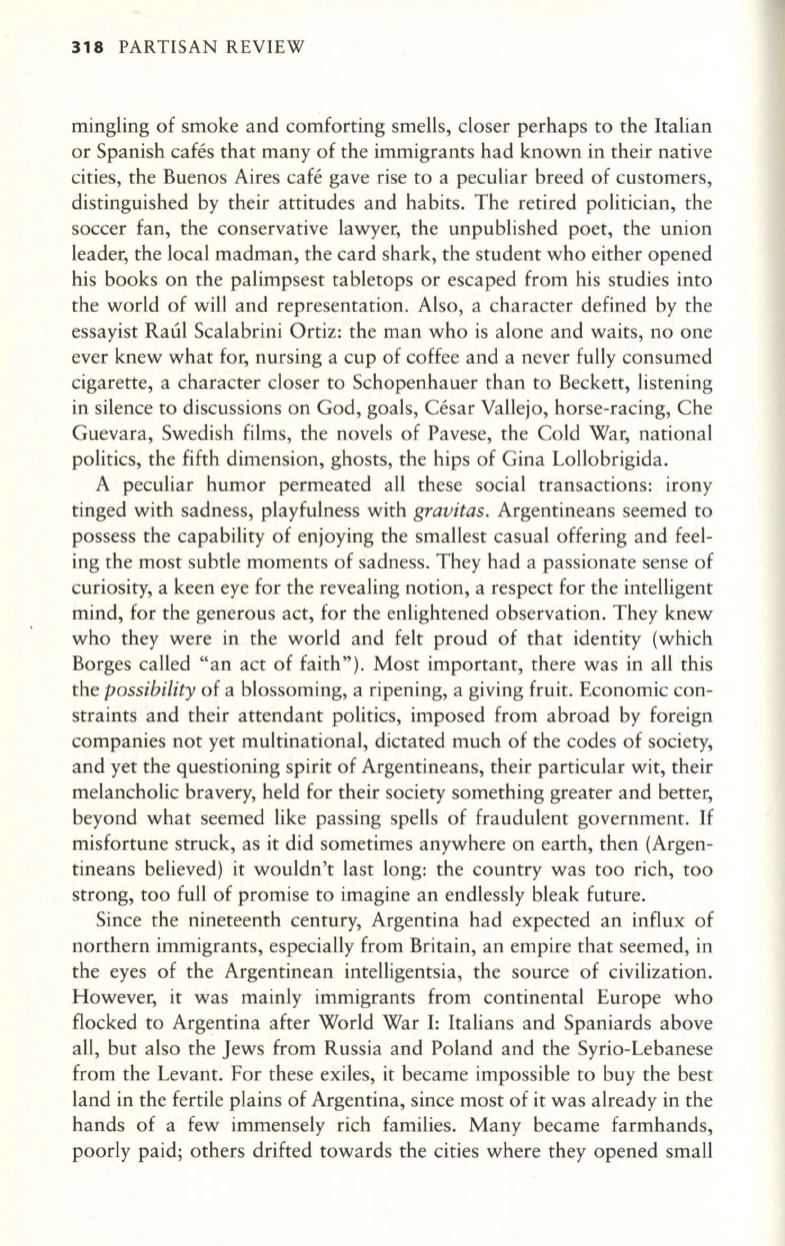
318
PARTISAN REVIEW
mingling of smoke and comforting smells, closer perhaps to the Italian
or Spanish cafes that many of the immigrants had known in their native
cities, the Buenos Aires cafe gave rise to a peculiar breed of customers,
distinguished by their attitudes and habits. The retired politician, the
soccer fan, the conservative lawyer, the unpublished poet, the union
leader, the local madman, the card shark, the student who either opened
his books on the palimpsest tabletops or escaped from his studies into
the world of will and representation. Also, a character defined by the
essayist Raul Scalabrini Ortiz: the man who is alone and waits, no one
ever knew what for, nursing a cup of coffee and a never fully consumed
cigarette, a character closer to Schopenhauer than to Beckett, listening
in silence to discussions on God, goals, Cesar Vallejo, horse-racing, Che
Guevara, Swedish films, the novels of Pavese, the Cold War, national
politics, the fifth dimension, ghosts, the hips of Gina Lollobrigida.
A peculiar humor permeated all these social transactions: irony
tinged with sadness, playfulness with
gravitas.
Argentineans seemed to
possess the capability of enjoying the smallest casual offering and feel–
ing the most subtle moments of sadness. They had a passionate sense of
curiosity, a keen eye for the revealing notion, a respect for the intelligent
mind, for the generous act, for the enlightened observation. They knew
who they were in the world and felt proud of that identity (which
Borges called "an act of faith") . Most important, there was in all this
the
possibility
of a blossoming, a ripening, a giving fruit. Economic con–
straints and their attendant politics, imposed from abroad by foreign
companies not yet multinational, dictated much of the codes of society,
and yet the questioning spirit of Argentineans, their particular wit, their
melancholic bravery, held for their society something greater and better,
beyond what seemed like passing spells of fraudulent government.
If
misfortune struck, as it did sometimes anywhere on earth, then (Argen–
tineans believed) it wouldn't last long: the country was too rich, too
strong, too full of promise to imagine an endlessly bleak future .
Since the nineteenth century, Argentina had expected an influx of
northern immigrants, especially from Britain, an empire that seemed, in
the eyes of the Argentinean intelligentsia, the source of civilization.
However, it was mainly immigrants from continental Europe who
flocked to Argentina after World War I: Italians and Spaniards above
all, but also the Jews from Russia and Poland and the Syrio-Lebanese
from the Levant. For these exiles, it became impossible to buy the best
land in the fertile plains of Argentina, since most of it was already in the
hands of a few immensely rich families. Many became farmhands,
poorly paid; others drifted towards the cities where they opened small


